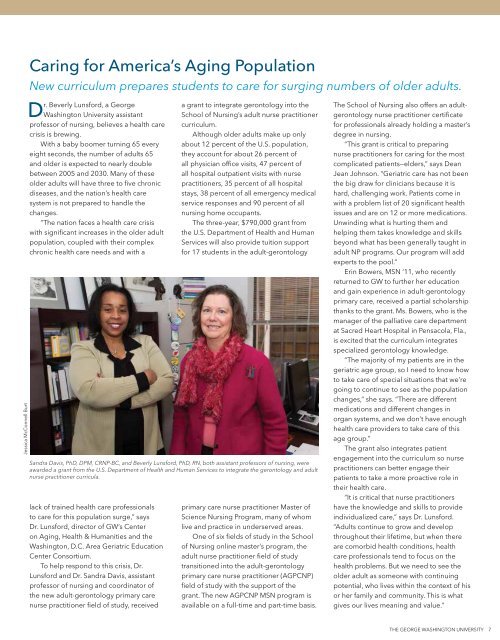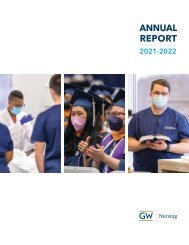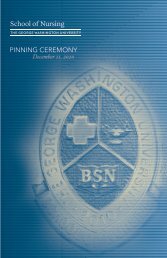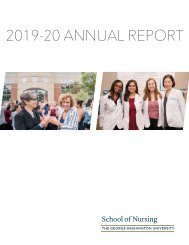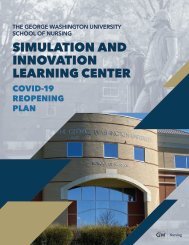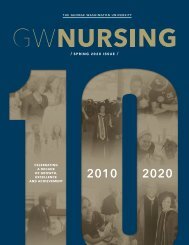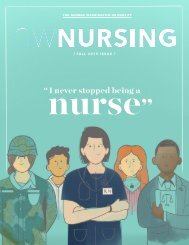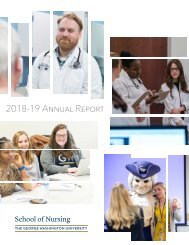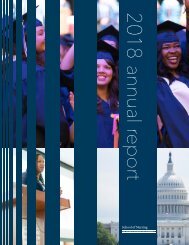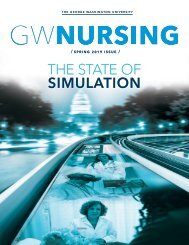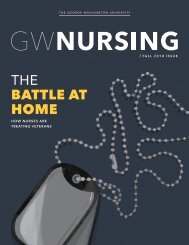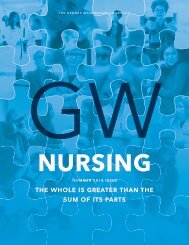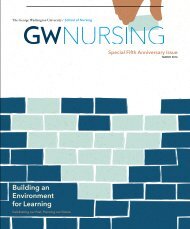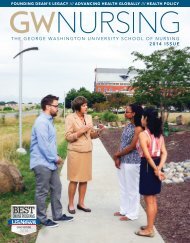GW Nursing Magazine Spring 2013
GW Nursing is a publication of the George Washington University School of Nursing. The magazine tells the story of GW nurses and their endeavors in the areas of education, research, policy and practice.
GW Nursing is a publication of the George Washington University School of Nursing. The magazine tells the story of GW nurses and their endeavors in the areas of education, research, policy and practice.
Create successful ePaper yourself
Turn your PDF publications into a flip-book with our unique Google optimized e-Paper software.
Jessica McConnell Burt<br />
Caring for America’s Aging Population<br />
New curriculum prepares students to care for surging numbers of older adults.<br />
Dr. Beverly Lunsford, a George<br />
Washington University assistant<br />
professor of nursing, believes a health care<br />
crisis is brewing.<br />
With a baby boomer turning 65 every<br />
eight seconds, the number of adults 65<br />
and older is expected to nearly double<br />
between 2005 and 2030. Many of these<br />
older adults will have three to five chronic<br />
diseases, and the nation’s health care<br />
system is not prepared to handle the<br />
changes.<br />
“The nation faces a health care crisis<br />
with significant increases in the older adult<br />
population, coupled with their complex<br />
chronic health care needs and with a<br />
lack of trained health care professionals<br />
to care for this population surge,” says<br />
Dr. Lunsford, director of <strong>GW</strong>’s Center<br />
on Aging, Health & Humanities and the<br />
Washington, D.C. Area Geriatric Education<br />
Center Consortium.<br />
To help respond to this crisis, Dr.<br />
Lunsford and Dr. Sandra Davis, assistant<br />
professor of nursing and coordinator of<br />
the new adult-gerontology primary care<br />
nurse practitioner field of study, received<br />
a grant to integrate gerontology into the<br />
School of <strong>Nursing</strong>’s adult nurse practitioner<br />
curriculum.<br />
Although older adults make up only<br />
about 12 percent of the U.S. population,<br />
they account for about 26 percent of<br />
all physician office visits, 47 percent of<br />
all hospital outpatient visits with nurse<br />
practitioners, 35 percent of all hospital<br />
stays, 38 percent of all emergency medical<br />
service responses and 90 percent of all<br />
nursing home occupants.<br />
The three-year, $790,000 grant from<br />
the U.S. Department of Health and Human<br />
Services will also provide tuition support<br />
for 17 students in the adult-gerontology<br />
Sandra Davis, PhD, DPM, CRNP-BC, and Beverly Lunsford, PhD, RN, both assistant professors of nursing, were<br />
awarded a grant from the U.S. Department of Health and Human Services to integrate the gerontology and adult<br />
nurse practitioner curricula.<br />
primary care nurse practitioner Master of<br />
Science <strong>Nursing</strong> Program, many of whom<br />
live and practice in underserved areas.<br />
One of six fields of study in the School<br />
of <strong>Nursing</strong> online master’s program, the<br />
adult nurse practitioner field of study<br />
transitioned into the adult-gerontology<br />
primary care nurse practitioner (AGPCNP)<br />
field of study with the support of the<br />
grant. The new AGPCNP MSN program is<br />
available on a full-time and part-time basis.<br />
The School of <strong>Nursing</strong> also offers an adultgerontology<br />
nurse practitioner certificate<br />
for professionals already holding a master’s<br />
degree in nursing.<br />
“This grant is critical to preparing<br />
nurse practitioners for caring for the most<br />
complicated patients—elders,” says Dean<br />
Jean Johnson. “Geriatric care has not been<br />
the big draw for clinicians because it is<br />
hard, challenging work. Patients come in<br />
with a problem list of 20 significant health<br />
issues and are on 12 or more medications.<br />
Unwinding what is hurting them and<br />
helping them takes knowledge and skills<br />
beyond what has been generally taught in<br />
adult NP programs. Our program will add<br />
experts to the pool.”<br />
Erin Bowers, MSN ‘11, who recently<br />
returned to <strong>GW</strong> to further her education<br />
and gain experience in adult-gerontology<br />
primary care, received a partial scholarship<br />
thanks to the grant. Ms. Bowers, who is the<br />
manager of the palliative care department<br />
at Sacred Heart Hospital in Pensacola, Fla.,<br />
is excited that the curriculum integrates<br />
specialized gerontology knowledge.<br />
“The majority of my patients are in the<br />
geriatric age group, so I need to know how<br />
to take care of special situations that we’re<br />
going to continue to see as the population<br />
changes,” she says. “There are different<br />
medications and different changes in<br />
organ systems, and we don’t have enough<br />
health care providers to take care of this<br />
age group.”<br />
The grant also integrates patient<br />
engagement into the curriculum so nurse<br />
practitioners can better engage their<br />
patients to take a more proactive role in<br />
their health care.<br />
“It is critical that nurse practitioners<br />
have the knowledge and skills to provide<br />
individualized care,” says Dr. Lunsford.<br />
“Adults continue to grow and develop<br />
throughout their lifetime, but when there<br />
are comorbid health conditions, health<br />
care professionals tend to focus on the<br />
health problems. But we need to see the<br />
older adult as someone with continuing<br />
potential, who lives within the context of his<br />
or her family and community. This is what<br />
gives our lives meaning and value.”<br />
THE GEORGE WASHINGTON UNIVERSITY 7


